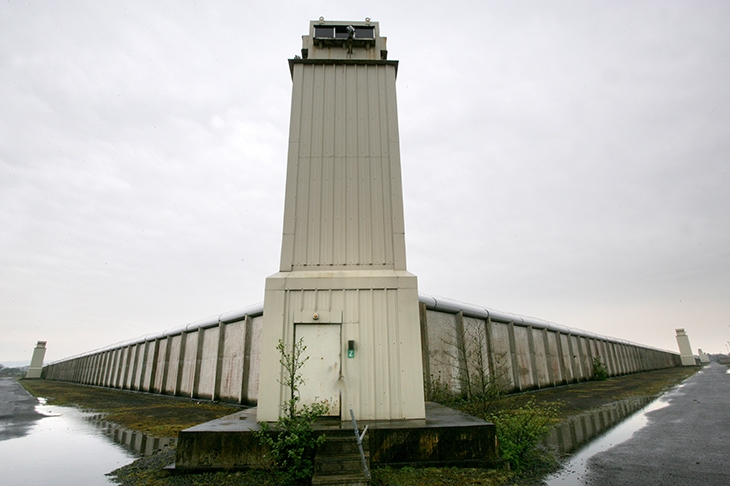‘I’m not here to rehabilitate,’ says Pamela, who teaches creative writing to prisoners in Northern Ireland. She doesn’t think of her work as being about bars, bare walls and what happens when they leave jail. It’s all about meeting the prisoner as a person. She soon realised ‘how different prison writing is’. It’s much more direct, heartfelt. Jamie wrote a poem after just half an hour in Pamela’s class. He gave it the title ‘My journey in the care system’. More than a quarter of all prisoners were brought up in care, a figure that rises to almost half for those aged under 25. To Jamie it was a relief, ‘getting that finally out in the open’. Now his poem is published in the magazine Time In, which Pamela creates with her students.
She and Jamie were talking to Carlo Gebler on Inside Stories, the Sunday night feature on Radio 3 (produced by Conor Garrett). Gebler has spent almost 30 years as a tutor in the prison system and is accustomed to the strangeness of being in a cell with a high-security student. ‘Being meaningfully engaged while in prison through art or education,’ he argues, ‘is surely what every prisoner should be.’ But he, too, is adamant that it’s not about rehabilitation, about making better people for the good of society. It’s about giving prisoners the basic human right to education, which so many of them have missed out on because of chaotic lives at home, school exclusions, trouble that often begins as early as nine or ten before they’ve even left primary school.
Now Gebler wonders whether he has made any difference. He taught at the Maze prison during the Troubles. Every wing had a library stacked with books, anything from Karl Marx to Shakespeare. Tim, who served a sentence for possession of arms and explosives, came across a collection of American short stories. Reading them was like ‘a marvel’ because he forgot entirely where he was, in a cell in H-block. He escaped, in his mind. Writing, too, stopped the boredom, the monotony of every day being the same.
This was an inspiring programme because of Gebler’s impassioned commitment and the survival skills of those he spoke to. ‘Prison nearly killed me and you guys helped me live through it,’ said one of his former students. I hope Rory Stewart, the Prisons Minister, was listening. Also the governor of the young offenders’ institution somewhere north of Birmingham where Freddie Pargetter is currently incarcerated on a drugs charge. He could do with some meaningful engagement.
It’s been hard to work out what the writers are trying to achieve with this social-conscience storyline in The Archers. Freddie’s sudden fall from grace, his willingness to be drawn into Ellis’s unsavoury circle, his obsession with earning money from drugs came out of nowhere. He was given one of those unexplained character makeovers beloved of soaps in need of a dramatic storyline. Poor Freddie has been wrung through the mill. His mother’s attempts to get him off his sentence by calling on a posh barrister can surely not be allowed to work otherwise it will be seen as a classic case of rich white boy being given special treatment.
Over on Radio 2, the network (currently shedding its star presenters with the news that Simon Mayo is now leaving the drive-time show after months of speculation and bad press) devoted its Faith in the World Week to the gospel rapper artist Guvna B. He grew up on an East London estate and remembers seeing his first gun aged 11 when a friend pulled one out of his backpack ‘like a video game’. He realised then that a few wrong decisions can lead to something dangerous. In Keeping the Peace with Guvna B (produced by Dan Tierney) he wanted to find out how people choose to be peacemakers, not breakers.
Mark was set upon on his way home from school six years ago and stabbed several times for no reason. ‘I saw my funeral happening.’ He decided that ‘God has put me through this for a reason,’ and he now works mentoring young people. We don’t care enough, said another youth worker with the Oasis project in Waterloo. He told us about the 92-year-old volunteer who sits in the coffee shop and listens to anyone who comes in, sharing stories. He says it’s given him a new lease of life. ‘Too many young people don’t feel part of anything. We have to make them feel special,’ says Guvna B. He also talked to Colin and Wendy Parry whose son Tim was killed in the Warrington bomb attack by the IRA. ‘We don’t forgive,’ says Wendy, ‘but we have never been angry.’ Instead they have set up their Peace Foundation, creating projects with children as young as five, planting peace in the playground. There was a lot of music in this programme — Johnny Cash, Louis Armstrong, the Black-Eyed Peas, Guvna B himself — but it was used to reflect on and add meaning to what was being said, the rhythms of speech and music complementing each other rather than battling it out while the listener struggles to keep up.






Comments